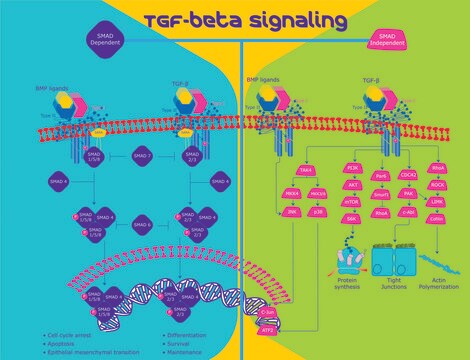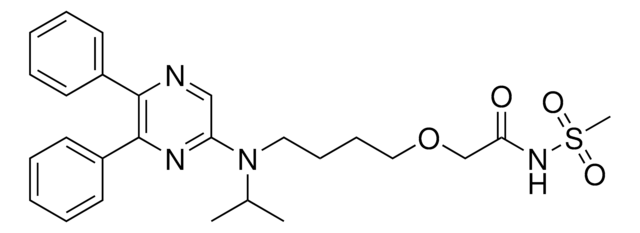SRP3147
Relaxin-2 Peptide
≥98% (HPLC), human recombinant, expressed in E. coli, suitable for cell culture
Synonim(y):
H2 relaxin, RLN2
Zaloguj sięWyświetlanie cen organizacyjnych i kontraktowych
About This Item
Kod UNSPSC:
12352202
NACRES:
NA.32
Polecane produkty
Nazwa produktu
Relaxin-2 human, recombinant, expressed in E. coli, ≥98% (SDS-PAGE), ≥98% (HPLC), suitable for cell culture
pochodzenie biologiczne
human
rekombinowane
expressed in E. coli
Próba
≥98% (HPLC)
≥98% (SDS-PAGE)
Formularz
lyophilized
masa cząsteczkowa
6.0 kDa
opakowanie
pkg of 25 μg
metody
cell culture | mammalian: suitable
zanieczyszczenia
<0.1 EU/μg endotoxin, tested
kolor
white
numer dostępu UniProt
Warunki transportu
wet ice
temp. przechowywania
−20°C
informacje o genach
human ... RLN2(6019)
Powiązane kategorie
Opis ogólny
Relaxin-2 is a peptide hormone structurally related to insulin. The gene is mapped to human chromosome 9p24. It is expressed in the placenta, decidua, prostate, corpus luteum, endometrium, mammary glands, heart, and brain. It is also expressed in the ovary during pregnancy. Recombinant relaxin-2 is a nonglycosylated 6kDa disulfide linked heterodimeric protein consisting of a 24 amino acid A-chain and a 29 amino acid B-chain.
Zastosowanie
Relaxin-2 human został wykorzystany do badania wpływu testosteronu na ekspresję receptora relaksiny w stawie kolanowym.
Został on również wykorzystany do badania jego wpływu na linie komórkowe ludzkiego raka endometrium.
Działania biochem./fizjol.
Of the three known relaxin genes, Relaxin-2 (RLN2) is the only relaxin known to circulate in the blood. Relaxin-2 binds specifically to the LGR7 (leucine-rich repeat-containing G-protein coupled receptor 7) and LGR8 receptors, previously identified as an "orphan" G protein coupled receptors. Signaling by Relaxin-2 through its target receptors enhances the growth of pubic ligaments and ripening of the cervix during birth. Relaxin-2 also participates in cancer progression. In prostate cancer, it is responsible for tumor growth and vascularisation. Relaxin-2 is also linked with anti-fibrotic and cardioprotective effects.
Sekwencja
Łańcuch A: QLYSALANKC CHVGCTKRSL ARFC Łańcuch B: DSWMEEVIKL CGRELVRAQI AICGMSTWS
Postać fizyczna
Lyophilized with no additives.
Rekonstytucja
Centrifuge the vial prior to opening. Reconstitute in water to a concentration of 0.1-1.0 mg/ml. Do not vortex. This solution can be stored at 2-8°C for up to 1 week. For extended storage, it is recommended to further dilute in a buffer containing a carrier protein (example 0.1% BSA) and store in working aliquots at -20°C to -80°C.
Ta strona może zawierać tekst przetłumaczony maszynowo.
Kod klasy składowania
11 - Combustible Solids
Klasa zagrożenia wodnego (WGK)
WGK 3
Temperatura zapłonu (°F)
Not applicable
Temperatura zapłonu (°C)
Not applicable
Wybierz jedną z najnowszych wersji:
Masz już ten produkt?
Dokumenty związane z niedawno zakupionymi produktami zostały zamieszczone w Bibliotece dokumentów.
The complex binding mode of the peptide hormone H2 relaxin to its receptor RXFP1.
Sethi A, et al.
Nature Communications, 7, 11344-11344 (2016)
Evolution of the relaxin/insulin-like gene family in anthropoid primates.
Arroyo JI, et al.
Genome Biology and Evolution, 6, 491-499 (2014)
Dual blockade of PKA and NF-?B inhibits H2 relaxin-mediated castrate-resistant growth of prostate cancer sublines and induces apoptosis.
Vinall RL, et al.
Hormones & Cancer, 2, 224-238 (2011)
Human relaxin-2: historical perspectives and role in cancer biology.
Nair VB, et al.
Amino Acids, 43, 1131-1140 (2012)
Analysis of the 5'-upstream regions of the human relaxin H1 and H2 genes and their chromosomal localization on chromosome 9p24.1 by radiation hybrid and breakpoint mapping.
Garibay-Tupas JL, et al.
Journal of Molecular Endocrinology, 23, 355-365 (1999)
Nasz zespół naukowców ma doświadczenie we wszystkich obszarach badań, w tym w naukach przyrodniczych, materiałoznawstwie, syntezie chemicznej, chromatografii, analityce i wielu innych dziedzinach.
Skontaktuj się z zespołem ds. pomocy technicznej






